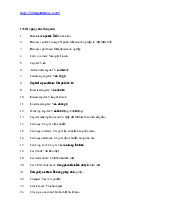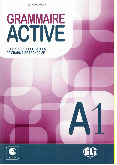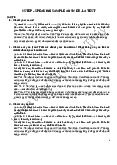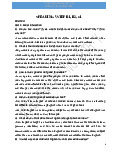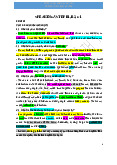




Preview text:
San José State University Writing Center www.sjsu.edu/writingcenter Written by Julia Skapik
Independent and Dependent Clauses
All our writing is made up of what we call “clauses.” Sometimes the clause is an entire sentence,
and sometimes the clause will make up only part of the sentence. With an understanding of the
differences between different types of clauses, we can make sure our writing is grammatically
correct and easy to understand. (For additional information regarding punctuation and clauses,
please see our handout on commas.) What is a clause?
A clause is any group of words that contains a subject (noun) and a predicate (verb). Another
way to look at it is that a clause must have something (subject) performing an action (predicate).!
Subject (noun) + predicate (verb) = clause
There are two main types of clauses: independent and dependent. Both of these types of clauses
have a subject and predicate, but the difference is that independent clauses express a complete
thought, which means that they can stand on their own as complete sentences.
Independent Clauses
An independent clause can be understood if it is read on its own.! Example: Juan walked.
Here we have an independent clause made up of a subject, “Juan,” and a verb, “walked.” This
sentence is complete because we know the subject and the action; additionally, this verb does not
need an object to complete it. However, sometimes, the verb needs an object, or something that
receives the action, to complete the thought. Example: I threw the ball.
First, let’s look for the verb, or action, of the sentence. The action in this sentence is “threw.”
Now, we need to find out who performed the action. “I” performed the action “threw.” Now we
ask, what did the subject throw? The answer is “the ball,” so “the ball” is our object because it receives the action.
If the sentence only said, “I threw,” the reader would be left asking “What did you throw?” The
object is required to complete the thought.
Independent and Dependent Clauses, Fall 2021. 1 of 5
Example: Paul bought some bread.
Let’s identify the verb first. The verb, or action, in this sentence is “bought.” Now, let’s identify
the subject. Who is doing the action? “Paul” is. What did Paul buy? He bought “bread.”
Once again, without the object, the reader is left wondering what Paul bought, so even though
“Paul bought” contains a subject and a predicate, it is not an independent clause because it does
not express a complete thought.
Important note: Not all independent clauses require objects to express a complete thought.
Clauses like “She ran,” “Miguel shopped,” and “They cooked” are all independent because the
reader does not need any additional information to understand what is going on, even though they do not have objects.
Dependent Clauses
Dependent clauses are different from independent clauses because they rely on an independent
clause to express a complete thought. Dependent clauses cannot stand on their own. Example: If Wendy goes today
The above example is a clause because it has a subject, “Wendy,” and a predicate, “goes.”
However, it does not express a complete thought. The reader is wondering what happens i f
Wendy goes today. This sentence is dependent on another clause to finish its thought.
Example: If Wendy goes today, she won’t have to go tomorrow.
By adding an independent clause, the thought is now complete. The reader now knows what will happen if Wendy goes today.
There are three types of dependent clauses: , and nominal, relative subordinate.
Nominal clauses can be used in place of a noun. We use these clauses to add more information to
a sentence. We can identify nominal clauses in our sentences by looking for the words “that,”
“who,” “what,” “when,” “where,” “why,” “how,” and “which.”
Nominal clauses often take the place of the object in the sentence, which means that they receive
the action of the verb. We can check if clauses are nominal by replacing the clause with “it” to see if it makes sense.
Example: She understood that she needed to finish her work before her vacation.
Independent and Dependent Clauses, Fall 2021. 2 of 5
We can replace the italicized section with “it,” and the sentence would read, “She understood it.”
This sentence makes sense because both “it” and “that she needed to finish her work before her
vacation” complete the idea of what is being understood.
Example: They knew when they were leaving for the movie.
Using the test described above, we can substitute the italicized section with “i ,” and the t
sentence still makes sense. “They knew it.”
Relative clauses appear similar to nominal clauses because they also start with the words “that,”
“who,” “what,” “when,” “where,” “why,” “how,” and “which.” The difference between nominal
and relative clauses is that relative clauses describe the nouns that come before them. They function adjectivally.
Example: They had an alarm clock that played an annoying song.
The phrase “that played an annoying song” is giving the reader more description about the alarm
clock. Notice here that if we tried to replace the italicized clause with “it,” the sentence would no
longer make sense: “They had an alarm clock it.” This test confirms that the clause is not nominal.
Example: They conducted a survey, which asked participants to rate their sleep.
The clause “which asked participants to rate their sleep” gives more information about the survey
that the researchers used. Once again, the sentence would not make sense if i said, “They t conducted a survey it.”
Subordinate clauses function adverbially in a sentence, which means that they relate to the main
verb in the sentence. Subordinate clauses help to show the relationship between the different
clauses in the sentence, and they always start with a subordinating conjunction. There are many
subordinating conjunctions, but the more common ones include “if,” “since,” “although,” “even
though,” and “because.” For more information on subordinate clauses, please see our handout that focuses exclusively on .
subordinating conjunctions and clauses
Example: Yolanda was late for class because her car got a flat tire.
This sentence could be broken into two if we removed the subordinating conjunction “because.”
“Yolanda was late for class. Her car got a flat tire.” While we could guess that she was late
because of the flat tire, the addition of “because” tells us the relationship between these two
sentences, and we do not have to wonder if she was late because of her flat tire.
Independent and Dependent Clauses, Fall 2021. 3 of 5
Example: If I cook dinner now, it will be ready when I get home.
If we removed the subordinating conjunction “if,” these sentences would not make sense. “I cook
dinner now. It will be ready when I get home.” We need the subordinating conjunction to clarify
the relationship between these two clauses. Activity 1
Identify the clause(s) of each sentence; try underlining each subject/predicate pair you can find.
Determine whether the clause is independent or dependent.
1. My car broke down yesterday, so I didn’t make it to work on time.
2. Even if you do not meet the prerequisites for the class, you can fill out the required forms.
3. Meteorologists predict a dry winter this year.
4. We need to apply a new coat of sealant to our fishing boat; it nearly sunk last week.
5. Many construction contractors are out of work when the housing market is bad. Activity 2
Determine the type of dependent clause(s) in each sentence (nominal, relative, subordinate). If
you are having trouble deciding whether the clause is nominal or relative, try the “i ” substitution t
test that is outlined in this handout.
1. Last weekend, we went to several antique shops though we didn’t make any large purchases.
2. The city, which was first settled during the early Middle Ages, contains several architectural
styles, though many of the original buildings were destroyed during World War II.
3. On my vacation, I visited where my mother was born.
4. Instead of going to the grocery store, you should shop at the local farmer’s market, which has comparable prices.
5. Since you’re having a dinner party next weekend, I know someone who can redo the finish on this coffee table.
6. The band started playing when the stage manager gave them the cue.
7. I gave her the report last week when she asked me to print out the final draft.
8. Though the judge has earned the label of being tough on crime, there are still rampant crime problems in the city. Answer Key for Activity 1
1. car (subject) broke down (verb) (independent); I (s) didn’t make (v) (independent)
2. you (s) do not meet (v) (dependent); you (s) can fill out (v) (independent)
3. meteorologists (s) predict (v) (independent)
4. we (s) need (v) (independent); it (s) sunk (v) (independent)
5. contractors (s) are (v) (independent); market (s) is (v) (dependent)
Independent and Dependent Clauses, Fall 2021. 4 of 5
Answer Key for Activity 2
1. though we didn’t make any large purchases = subordinate clause
2. which was first settled during the early Middle Ages = relative clause; though many of the
original buildings were destroyed during World War II = subordinate clause
3. where my mother was born = nominal clause
4. which has comparable prices = relative clause
5. since you’re having a dinner party next weekend = subordinate clause; who can redo the finish
on this coffee table = relative clause
6. when the stage manager gave them the cue = subordinate clause
7. when she asked me to print out the final draft = relative clause
8. though the judge has earned the label of being tough on crime = subordinate clause
Independent and Dependent Clauses, Fall 2021. 5 of 5
